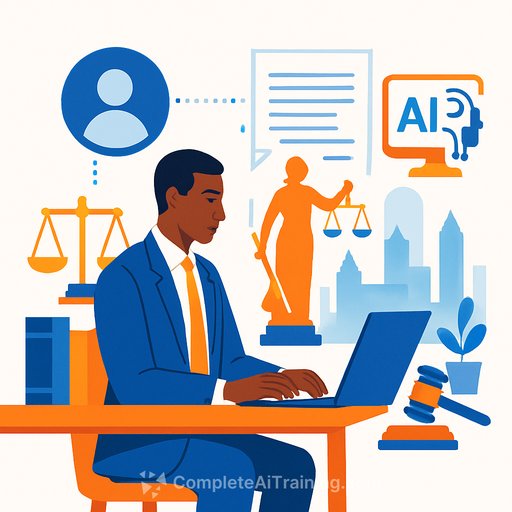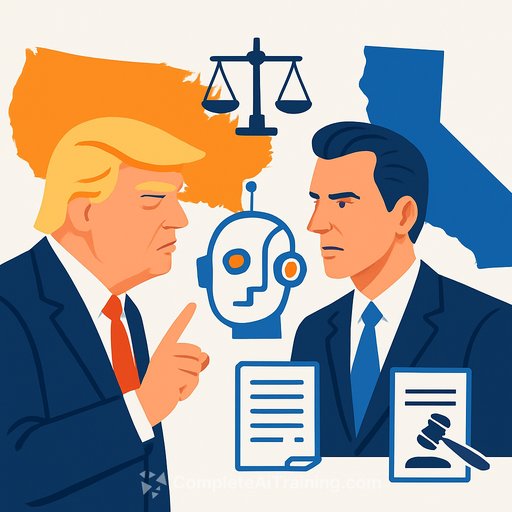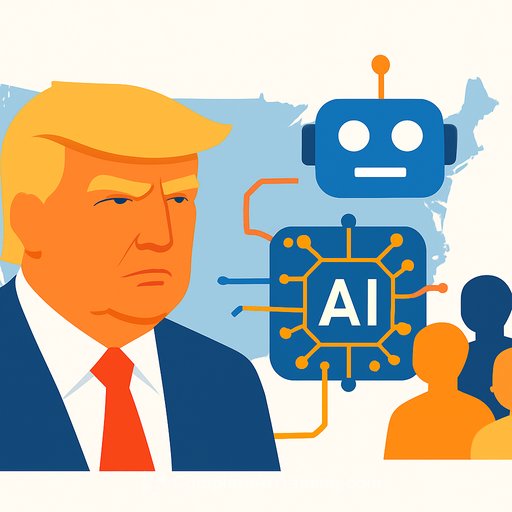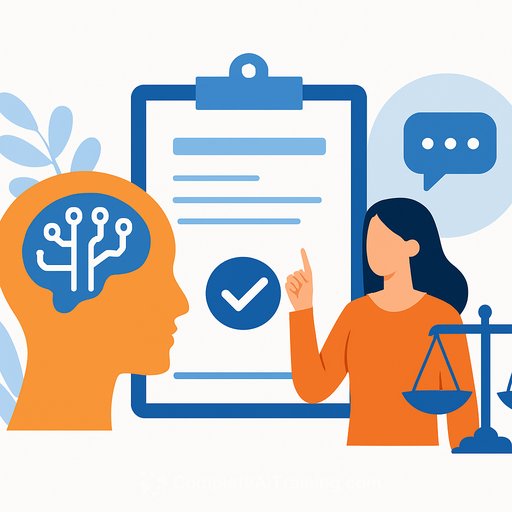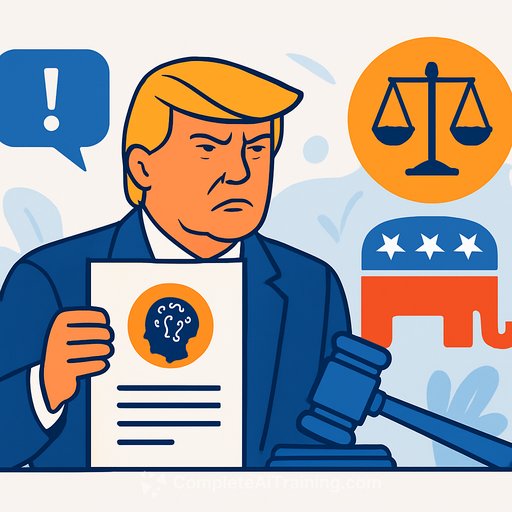The Complete Guide to Using AI as a Legal Professional in Atlanta in 2025
Last Updated: August 9th, 2025
Too Long; Didn't Read:
In 2025, 69% of Atlanta legal professionals use AI tools like legal research platforms and contract review software, which boosts efficiency and cuts burnout by 76%. Focusing on ethical use, transparency, and ongoing training ensures AI supports workflows without replacing human expertise in Georgia's legal field.
How Artificial Intelligence is Being Used by Legal Professionals in Atlanta
Atlanta's legal professionals are actively adopting AI to improve workflows and boost efficiency. At events like the Legal Innovation Forum Atlanta 2025, experts highlight how AI automates tasks such as document review, contract analysis, and litigation strategy development. These tools help legal teams manage digital risks and comply with complex regulations.
Panels like the ACC Georgia's focus on responsible AI adoption provide practical advice on evaluating and integrating AI while maintaining quality and ethics. The AI Legal Summit 2025 further emphasizes AI's role in enhancing legal research, supporting dispute resolution, and improving operations, all while addressing ethical challenges.
This shows AI is a practical force that helps lawyers focus on strategic advice and client solutions by streamlining routine work and improving risk management.
Will AI Replace Lawyers in Atlanta by 2025?
AI will not replace lawyers in Atlanta by 2025. Instead, it changes how legal work is done. The 2025 AffiniPay Legal Industry Report shows 69% of legal professionals use AI, with 76% reporting less burnout due to automated tasks like case law summarization and document review.
The U.S. Bureau of Labor Statistics projects a 5.2% growth in lawyer employment through 2033, confirming demand remains strong. While accuracy and data security concerns exist, 46% of lawyers see AI as creating more career opportunities. AI frees lawyers from repetitive tasks, letting them focus on complex legal work and client relationships.
Human oversight and ethical frameworks remain essential, especially in Georgia. Lawyers are encouraged to develop skills in working alongside AI rather than fearing replacement.
Top AI Tools Recommended for Legal Professionals in Atlanta in 2025
- Casetext CoCounsel: Automates legal research and document analysis with extensive state and federal law coverage.
- Lexis+ AI: Offers personalized AI assistance for drafting, summarizing, and reviewing documents, delivering high ROI for firms.
- Smith.ai AI Receptionist: Provides 24/7 client engagement and call handling, ideal for solo and small firms to enhance responsiveness.
- Everlaw and Diligen: Streamline e-discovery and contract analysis to save time on complex tasks.
- Auto-GPT: Supports autonomous task execution to further simplify operations.
These tools help legal professionals automate routine work like contract review and litigation prep, keeping them competitive in a fast-changing digital environment.
Ethical and Legal Considerations for Using AI in Atlanta's Legal Practice
Using AI in legal practice requires careful attention to ethics and legality. Cases of AI misuse, such as fabricated case law in filings from Georgia, highlight the risks of relying on AI outputs without verification.
Lawyers must maintain technological competence, recognize AI limitations, and prevent errors caused by inaccurate or biased AI data. Transparency with clients, informed consent, and strict data confidentiality are essential.
Continuing Legal Education programs by the State Bar of Georgia stress ethical AI use, including vendor vetting, human oversight, and maintaining professional judgment. AI systems should provide explainable outputs to uphold due process and ensure access to justice.
Implementing governance frameworks, professional supervision, and ongoing education helps Atlanta's legal sector use AI responsibly while complying with Georgia’s professional conduct rules.
AI Adoption Trends and Challenges Among Atlanta Legal Firms
AI adoption is growing quickly among Atlanta legal firms, with 69% of professionals using AI overall. In-house teams lead at 81%, while law firms report 55% adoption.
AI helps reduce burnout (76%) and improves communication (64%). Still, challenges like security concerns (48%), accuracy issues (44%), and limited training (24%) slow full integration.
Firms in Atlanta, including personal injury specialists, use AI for client intake, research, and marketing automation to boost efficiency and engagement. Prioritizing workflow-aligned AI tools, investing in staff training, and ensuring regulatory compliance are key to overcoming hurdles and maximizing AI’s benefits.
Continuing Education and AI-Focused Events for Legal Professionals in Atlanta
Several 2025 events and programs provide opportunities to build AI skills:
- Legal Innovation Forum Workshop (March 20): Hands-on AI strategy and ethics training for in-house lawyers, offering 3.5 CLE hours with ethics credit.
- ACC Georgia Panel (May 6): Focuses on responsible AI adoption in legal practice, awarding 1.0 CLE credit.
- CALIcon 2025 (June 6): Discusses AI in legal education and research, promoting critical thinking.
- ABA On-Demand Program: Covers AI’s role in mediation and dispute resolution, showing how AI improves efficiency and fairness.
- Seyfarth's CLE Hub: Offers webinars and courses on AI, ethics, and data privacy tailored for busy Georgia lawyers.
For legal professionals seeking practical AI training, programs like those offered at Complete AI Training provide accessible courses on using AI tools and prompt engineering without technical prerequisites.
AI Governance and Institutional Guidelines Influencing Atlanta's Legal Sector
Georgia is establishing AI governance frameworks to guide legal sector adoption. The state’s AI Roadmap addresses ethics, risk management, and data privacy, supported by an AI Advisory Council and sector-specific guidelines.
The Association of Corporate Counsel’s AI Toolkit for In-House Lawyers, created with Kilpatrick Townsend & Stockton LLP, offers governance checklists and compliance roadmaps to help legal departments manage AI risks responsibly.
Events like Holland & Knight’s “AI Meets Payments” panel and the Legal Innovation Forum Atlanta encourage discussion on regulatory compliance, algorithmic bias, and AI’s legal challenges.
These efforts promote transparency, accountability, and ongoing education, enabling Atlanta’s legal professionals to implement AI while protecting clients and following evolving laws.
The Future of the Legal Profession in Atlanta with AI Integration
AI will shape Atlanta’s legal future by improving efficiency, accuracy, and strategic services, alongside ethical and regulatory challenges. The Legal Innovation Forum Atlanta 2025 highlights the need for lawyers to combine legal expertise with technological and business skills.
Across the U.S., AI frees up about 4 hours per week per lawyer by automating routine work, creating new billable hours and revenue. Still, human oversight remains critical to address ethical concerns and data security.
Research from Emory University calls for reforms in legal education and regulation to incorporate AI without sacrificing human judgment and creativity.
Large firms in Atlanta are adopting AI roles and collaborating with clients on AI use, innovating business models without disrupting traditional billing.
AI is a tool to support lawyers, not replace them. Developing skills in AI governance, ethics, and technology will help legal professionals lead and deliver client-focused solutions amid change.
Conclusion: Embracing AI to Elevate Legal Practice in Atlanta, Georgia in 2025
AI is reshaping legal practice in Atlanta in 2025 by boosting efficiency, lowering burnout, and letting lawyers focus on strategic work. Georgia’s Technology Authority promotes ethical AI use, data privacy, transparency, and human oversight to ensure AI complements legal expertise.
Leading firms integrate AI tools like legal research and contract review software carefully, balancing innovation with confidentiality and accuracy to avoid misinformation and bias risks.
With nearly 70% of legal professionals adopting AI and 93% reporting improved workflows, AI use is now essential for staying competitive.
Practical training programs such as those available at Complete AI Training help legal professionals and staff learn to use AI tools effectively, write prompts, and increase productivity without needing technical backgrounds.
Continuous education and ethical adherence are key to ensuring AI enhances legal practice while protecting client trust and data integrity in Atlanta’s legal sector.
Frequently Asked Questions
How is AI transforming the legal profession in Atlanta in 2025?
AI automates tasks like case law summarization, document review, contract analysis, and litigation prep. This improves efficiency, reduces burnout, and lets lawyers focus more on strategic advice and client work, while maintaining ethical and regulatory standards.
Will AI replace lawyers in Atlanta by 2025?
No. AI acts as a tool to support legal professionals by automating repetitive tasks and improving productivity. There is still strong demand for lawyers, and human oversight remains crucial.
What are the top AI tools recommended for legal professionals in Atlanta in 2025?
Recommended tools include AI-powered legal research and document analysis platforms, contract review software, and AI receptionists that improve client engagement and workflow automation.
What ethical and legal considerations must Atlanta legal professionals keep in mind when using AI?
Lawyers must prevent AI errors, guard client confidentiality, ensure transparency and informed consent, maintain technological competence, and follow Georgia’s professional conduct rules to use AI responsibly.
How can legal professionals in Atlanta stay ahead with AI integration?
They should engage in continuing education, attend AI-focused legal events, and take practical AI training courses like those offered at Complete AI Training to build skills in AI tools, ethics, and strategic use.
Your membership also unlocks:

